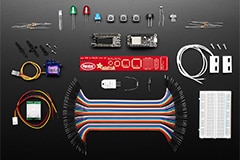WiFi is the standard wireless protocol used when connecting to the internet wirelessly at home, work, and basically everywhere in between.
SigFox is an LPWaN radio protocol however it is similar to a cellular network in style. Lady Ada discusses setup of SigFox as well as the pros and cons.
Adafruit and DigiKey have teamed up to present All the Internet of Things a six-part video series covering everything you could ever want to know about the Internet of Things.
Now that we have our things connected and talking, in this third episode of the All the Internet of Things series, Ladyada shows how to make them work together to do something useful!
Adafruit and DigiKey have teamed up to present All the Internet of Things a six-part video series covering everything you could ever want to know about the Internet of Things.
Lady Ada breaks down episode two of All the Internet of Things.
In this episode of the All the Internet of Things series, Ladyada demos the Adafruit IO system which makes data useful – focusing on ease of use and allowing simple data connections with little programming needed.
In the premiere episode of the All the Internet of Things series, Ladyada goes over all the different ways you can connect your device to "the cloud."
In the second episode of the All the Internet of Things series, Ladyada explores protocols or the language each machine, or machines, use to talk to each other.
In episode 5 of the All the Internet of Things series, Ladyada discusses the importance of safety and security at all steps of your design process.
In the fourth episode of the All the Internet of Things series, Ladyada focuses in on a robust Internet of Things service for makers and professional engineers alike: The Adafruit IO.
 IO+ Annual Subscription
Publish Date: 2019-03-05
IO+ Annual Subscription
Publish Date: 2019-03-05
Adafruit IO+ is the Internet of Things for everyone, built from the ground up to be the easiest way to stream, log, and interact with data.
 AdaBox003 ESP8266 Feather Based IoT Kit
Publish Date: 2017-08-11
AdaBox003 ESP8266 Feather Based IoT Kit
Publish Date: 2017-08-11
Adafruit's ADABOX003 is designed to introduce a new person the joys of making electronics and specifically the world of IoT.
A survey of research and frameworks on various technologies and techniques required for Industry 4.0 and Industrial IoT (IIoT) communication and security.
 TPL5110 Low-Power Timer Breakout
Publish Date: 2017-04-12
TPL5110 Low-Power Timer Breakout
Publish Date: 2017-04-12
Adafruit’s Power Timer breakout is a stand-alone board that utilizes the Texas Instruments TPL5110 to turn any electronics into a low-power project.
Use the Arduino's well-established hardware and software open-source ecosystems to accelerate and lower the cost of evaluating ICs, sensors, and peripherals.
Why choose a sensor module over a discrete solution for an Industrial IoT application?
10 tips for Arduino project designers that will save you time, money, and frustration. Arduino boards and accessories are available at DigiKey!
This practical article provides step-by-step instructions for connecting the miniature ESP8266 wireless microcontroller module to the IBM Watson IoT platform.
Single board computers provide a platform for IoT prototype development.
Programmable touchscreen LCD modules with Wi-Fi connectivity provide flexibility and ease of integration.
 Why and How to Kickstart Cellular IoT Projects Using Microchip’s IoT Development Board
Publish Date: 2022-09-08
Why and How to Kickstart Cellular IoT Projects Using Microchip’s IoT Development Board
Publish Date: 2022-09-08
Accelerate cellular IoT development using quick-start development boards with comprehensive IDE support.
The power of the Raspberry Pi single board computer can be implemented quickly and effectively if the user takes some advice from those with experience.
How to simplify the execution of IoT OTA firmware updates on Espressif Systems’ ESP32 microcontroller and associated modules and ESP-IDF.
Pairing a single board computer with a cellular modem eliminates smartphone or router gateways and dramatically extends the wireless range of maker projects.
To embed wireless connectivity for the IoT, designers need to understand how to evaluate the various interfaces to best meet their application requirements.
The LattePanda single board computer provides a Windows® 10 environment with Arduino compatibility.
Embedded developers needing wireless connectivity for their IoT designs have many options, but they need to choose and apply RF connectivity with great care.
10 tips and tricks that every designer should know before starting a project with a BeagleBone platform.
Use the ESP32 Wi-Fi/Bluetooth module to connect industrial automation equipment to the IoT.
Using Arduino BOBs, designers can quickly evaluate various combinations of MEMS accelerometers, gyroscopes, and magnetometers for motion and orientation.
The quad-core Raspberry Pi 3 and Pi-Zero-size CM3 elevate the Pi family with capabilities needed for increasingly demanding applications.
A wireless PLC provides embedded developers with an alternative method to develop real-time applications using ladder logic.
Designers can simplify data gathering for artificial intelligence by opting for simple sensors instead of complex multi-axis accelerometers.
CircuitPython dev boards offer a simpler approach for building embedded applications with sophisticated 32-bit MCUs.

















